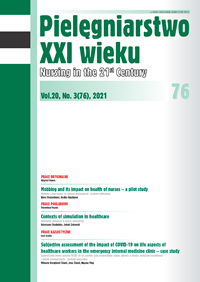The level of religiosity and health behaviour of the elderly people. Pilot study
DOI:
https://doi.org/10.2478/pielxxiw-2021-0025Keywords:
religiosity, pro-health behavior, risky behavior, elderly peopleAbstract
THE LEVEL OF RELIGIOSITY AND HEALTH BEHAVIOUR OF THE ELDERLY PEOPLE. PILOT STUDY
Introduction. Religiousness supports undertaking positive health behaviors.
Aim. Showing the correlation between the level of religiosity and selected pro-health and risky behaviors among the elderly people.
Material and methods. As research tools the original questionnaire and Scale of Individual Religion by A. Latała and P. Socha were used. The survey involved 120 participants. Analysis included 64 participants, who were all over 65 years old. U Mann-Whitney test, Kruskal-Wallis test, Spearman’s rank order correlation were used. The level of significance p<0.05 was assumed in the analysis.
Results. The studied group of elderly Roman Catholic people was mostly characterized by a high level of religiosity and pro-health behaviors. Correlation between pro-health and risky behaviors of the respondents and their religiosity turned out to be insignificant. However, people characterized by slightly higher level of religiosity declared behaviors such as: not smoking cigarettes, not drinking alcohol, consuming up to three main meals a day, maintain a healthy body weight, not eating between meals, regular doctor and dentist visits, spending little time in front of the TV and computer, being active, using sunscreen, doing self-examination of breasts or testicles once a month and falling asleep at fixed times.
Conclusions. The analyses did not confirm that religiosity is an important determinant of pro-health and risky behaviours of the elderly.
References
1. Herbut J. Filozofia religii: jej problematyka i jej odmiany. Filo-Sofija. 2011; 15(4): 911-917.
2. Krok D. Religijność a duchowość – różnice i podobieństwa z perspektywy psychologii religii. Polskie Forum Psychologiczne. 2019; 14(1): 126-141.
3. Zinnbauer BJ, Pargament KI. Religiousness and spirituality. [in:] Paloutzian RF, Park CL, eds. Handbook of the psychology of religion and spirituality. New York: Guilford Press; 2005, pp. 21-42.
4. Withers A, Zuniga K, Van Sell SL. Spirituality: Concept analysis. Int. J. Nurs. Clinical Practices. 2017; 4: 234-239.
5. Heszen-Niejodek I, Gruszczyńska E. Wymiar duchowy człowieka, jego znaczenie w psychologii zdrowia i jego pomiar. Prz. Psychol. 2004; 47(1): 15-31.
6. Godlewska D, Gebreselassie J. Religia a zdrowie i choroba. Język. Religia. Tożsamość. 2018; 17(1): 223-236.
7. Magdoń M, Skrzypek M, Klocek M. Religijność a zdrowie. Sztuka Leczenia. 1997; 3(2): 61-68.
8. Pawlikowski J, Marczewski K. Religia a zdrowie – czy religia może sprzyjać trosce o zdrowie? Część 1 – wartość zdrowia w wielkich religiach świata. Kardiol. Dypl. 2008; 7(10): 96-98.
9. Pawlikowski J, Sak J, Marczewski K. Religia a zdrowie – czy religia może sprzyjać trosce o zdrowie? Część 2 – religijność a zdrowie. Kardiol. Dypl. 2009; 8(1): 87-93.
10. Wąchol G. Wpływ czynników religijnych na terapię uzależnień. [w:] Dziedzic J, Klimek J, red. Wspomóc uzależnionych od alkoholu. Refleksja psychologiczno-teologiczna. Kraków: Uniwersytet Papieski Jana Pawła II. Wydawnictwo Naukowe; 2017, s. 146-172.
11. Zajęcka B. Rola duchowości w procesie leczenia osób uzależnionych od substancji psychoaktywnych. Pedagogika. 2016; 25(2): 265-276.
12. Woźniak B. Zaangażowanie religijne a stan zdrowia osób w wieku podeszłym: mechanizmy zależności, wybrane wyniki badań. Sociological Review. 2012; 61(2): 207-242.
13. Halicka M, Halicki J. Integracja społeczna i aktywność ludzi starszych. [w:] Synak B, red. Polska starość. Gdańsk: Wydawnictwo Uniwersytetu Gdańskiego; 2002, s. 189-218.
14. Borowik I. Religijność. [w:] Borowik I, Doktór T, red. Pluralizm religijny i moralny w Polsce. Kraków: Wydawnictwo Nomos; 2001, s. 13-46.
15. Krause N. An introduction to research on religion. aging and health: exploring new prospects and key challenges. [in:] Schaie K, Krause N, Booth A, eds. Religious influences on health and well-being in the elderly. New York: Springer Publishing Company; 2004, pp. 1-19.
16. Krause N. Aging in the Church. How social relationship affect health. 1st edition. West Conshohocken, Pennsylvania: Templeton Foundation Press; 2008.
17. Borowik I. Dlaczego religijność w Polsce nie ulega zmianom po 1989 roku? Pięć hipotez. [w:] Babiński G, Kapiszewska M, red. Zrozumieć współczesność. Wydanie 1. Kraków: Oficyna Wydawnicza AFM; 2009, s. 439-450.
18. Latała A, Socha P. Technika do badania indywidualnej religijności. Zeszyty Naukowe Uniwersytetu Jagiellońskiego. 1981; 612: 119-141.
19. Pędich W. Znaczenie religii w życiu człowieka starego. [w:] Synak B, red. Polska starość. Gdańsk: Wydawnictwo Uniwersytetu Gdańskie; 2002 s. 268-270.
20. Woźniak B, Zawisza K, Brzyska M. Religia a zdrowie – o zależności między zaangażowaniem religijnym a funkcjonowaniem ciała w starszym wieku. Studia Socjologiczne. 2015; 2(217): 215-239.
21. Woźniak B. Religiousness, well-being and ageing – selected explanations of positive relationships. Anthropological Review. 2015; 3(78): 260-269.
22. Sikora A, Majda A, Kurowska A. Religijność i zachowania zdrowotne pacjentów z depresją. Piel. Pol. 2021; 79(1): 1-7.
23. Pawlikowski J. Problemy metodologiczne w badaniach nad związkiem pomiędzy religijnością a zdrowiem. Studia Metodologiczne. 2013; 30: 123-144.
24. Zasępa E. Personalny wymiar religijności a struktura osobowości. Roczniki Psychologiczne. 2002; 5: 161-179.
Downloads
Published
Issue
Section
License
Copyright (c) 2021 Authors

This work is licensed under a Creative Commons Attribution-NonCommercial-NoDerivatives 4.0 International License.




